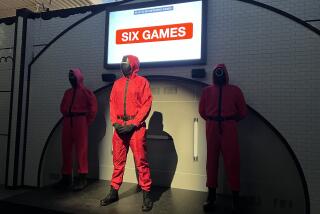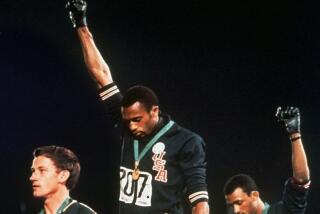Conner Tries to Clip OneWorld’s Sails
The quarterfinal repechage round of the Louis Vuitton Cup challenger trials for the America’s Cup started late, after three days of too little wind or too much wind, but that didn’t slow the elimination process.
There is more than one way to sink a rival.
Team Dennis Conner spent the last couple of days firing paper torpedoes into Seattle’s OneWorld, its opponent in the best-of-seven knockout series.
The New York Yacht Club entry protested to the event’s international jury that OneWorld, headed by billionaires Paul Allen and Craig McCaw, should be kicked out of the Cup for using secret Team New Zealand design information in the current competition. An initial hearing was scheduled Monday night to address procedural matters only.
A day earlier, Team Dennis Conner and Italy’s Prada had filed a joint application with the arbitration panel, which rules on violations of the protocol, which is meant to discourage dirty tricks. The paper referred to “recent access to evidence in connection with the possession and use by OneWorld of other syndicates’ design information.”
Why now, long after OneWorld has already been punished -- however lightly -- after previously admitting having such information?
The latest action charges OneWorld with using the stolen technology on its own boats and claims, in a Team Dennis Conner press release, to have 92 pages of “comprehensive documentary evidence” to back it up, without offering details.
The submission requests that “OneWorld be disqualified from both [the challengers trials and the America’s Cup],” the statement said.
The new development is connected to an affidavit by former Team New Zealand rules advisor Sean Reeves, long held but not made public by TNZ. Reeves, a lawyer who defected to OneWorld along with lead designer Laurie Davidson and several sailors after the 1995 defense, became the center of a firestorm when he had a falling out with OneWorld and allegedly peddled design information to other challengers, among them Team Dennis Conner and San Francisco’s Oracle BMW.
A source said that Team New Zealand consented to release the affidavit to the challengers only late last week.
However, Reeves, who is back living in the Auckland suburb of Devenport, may not be available to testify. He is under a gag order by a U.S. court in a legal action brought against him by OneWorld.
That could put Team Dennis Conner in an awkward position. Bill Trenkle, Conner’s general manager and longtime crew member, filed an affidavit in OneWorld’s behalf last February detailing Reeves’ offer to sell design secrets during a breakfast meeting in Del Mar in June 2001. Now Reeves’ affidavit may be Team Dennis Conner’s best evidence.
But there also was the disclosure offered by New Zealand’s ONE News TV last June about an e-mail allegedly sent to OneWorld by “a mast company executive” which read: “The work we have done to date on our own fittings [locks and such] has been essentially copying TNZ designs, based on input from ex-TNZ team members ... [and] it may be pretty obvious where some of the designs really originated.”
The e-mail apparently was meant as a warning.
In an apparent resolution of the matter in August, OneWorld’s mea culpa -- and a declaration that it hadn’t used the information -- got the team off with a minimal penalty from the arbitration panel: one point (i.e., victory) deducted from its score for the two round-robins in October.
OneWorld called it a “harsh but just penalty.”
The panel of five prominent international jurists with sailing backgrounds ruled, in part: “The panel accepts the unchallenged evidence given by the OWC witnesses, to the effect that the material wrongfully in their possession was not utilized by OWC for design purposes ... [and that] it may be impossible for another participant to prove that the information had been used.”
Not anymore, Team Dennis Conner and Prada say.
Lawyer Jim Farmer, representing Prada and Team Dennis Conner, was quoted in the New Zealand Herald as saying that his clients believed OneWorld had misled the arbitration panel during the last case and had intentionally used the design secrets.
“There is compelling evidence ... that there was actual, known use of Team New Zealand’s drawings,” the complaint to the panel says.
A century and a half of America’s Cup history is rife with such disputes. In 1986 at Fremantle, Australia, Conner questioned the legality of New Zealand’s fiberglass boats when all of the other 12-meters were built of aluminum.
In 1988, Conner’s team dragged New Zealand into court for a rogue challenge with a boat built to the limit of the rules -- then won with a catamaran. In 1992, at San Diego, Italy’s Il Moro fought to disqualify New Zealand for illegal use of a bowsprit.
SCHEDULE...D9


